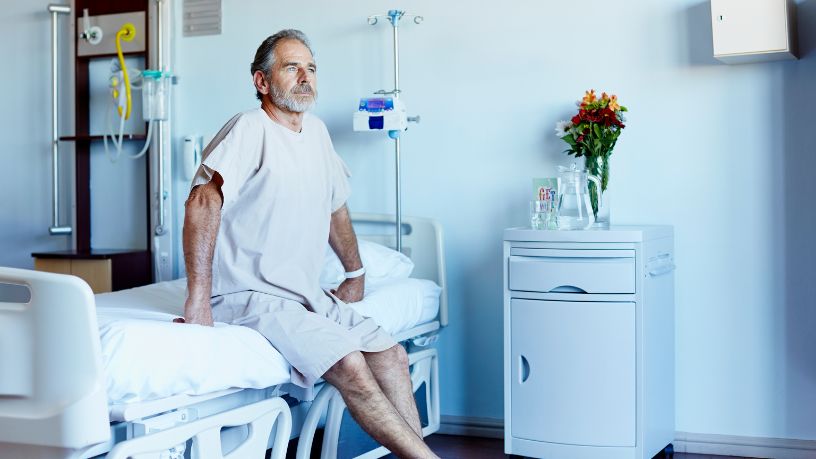If you’re recovering from an operation, injury or treatment, your body and mind need the right amount of time to recuperate.
On this page
Key takeaways
It’s important to listen to your body and carers during this period and not throw yourself back into normal life too quickly.
Find out how to tell people that you need more time to recover, including approaching loved ones and work.
A medical journey like an operation, treatment or injury can take its toll, both physically and emotionally. And it will take time before you’re back to your normal self.
When it comes to recovery, it’s important to move at your own pace. Sometimes, this means letting people know that you’re not quite ready to get back to things.
The importance of keeping people up to date
Talking about your recovery might be easy with some people and difficult with others. But it’s important to communicate your progress in a way that’s clear, respectful and firm.
People in your life may be curious about how you’re getting along. Letting them know about your progress can help them know you’re safe, happy and on the mend, and give them a better sense of where you stand.
Maintaining social connections while you recover isn’t just practical, either. Research indicates that social support during recovery can improve your healing outcomes.1
At the same time, though, it’s important to set boundaries with other people when you’re recovering. Particularly when you need a little extra time off. This can help create clarity around what you can and can’t do (like returning to work), giving everyone involved more peace of mind.
How to let people know you’re still recovering (without making it awkward)
Everybody’s recovery journey is different, and it’s important to move at your own pace. By giving yourself enough time to properly recuperate, you help yourself properly heal and prevent relapsed or prolonged pain (or other symptoms).
As you get to the later stages of your recovery, you might feel pressure from people around you to jump back into normal life. This might be work-people asking you to come back into the office, or it might be life-people inviting you out to dinner or a family get-together.
But you should never have to ‘push through’ or minimise your symptoms in order to meet other people’s expectations. This time is about you, and if you need to request a little more of it off, it’s important that you do.
Prescription medication delivered to your door
Recovering from home is a lot easier with free chemist delivery. Eligible Bupa members can now get prescription and over the counter medication and other chemist goods delivered directly to their door via Blua. Available to eligible customers only.
Telling your friends and family
Your loved ones might be eager to see you, and you may be eager to see them too! But you need to balance these expectations with your health. If you think that it’s not quite time to get back to your normal social routine, consider saying something like:
While I’m excited to see you, I’m just not up to it yet.
Chances are, your loved ones will understand and appreciate your recovery journey and honour your wishes. If they have trouble respecting your boundaries, though, or if there are children who don’t understand the situation, consider rephrasing the dialogue to something like:
I understand and appreciate that you’re eager to see me! But I’m still feeling flat and I will need a little bit more time on my own.
You might also suggest different activities with loved ones, like watching a movie at home instead of going to a cinema, or eating a meal in instead of having one at a restaurant.
Telling work
Letting work know that you need more time to recover can be tricky, particularly when your boss and colleagues are expecting you back. But it’s important that you don’t push yourself.
If you feel that a boss or colleague isn’t respecting your need for more time off, you might need to explore other channels, such as contacting HR. Often, workplaces have policies around time off, so understanding your rights will help clarify things.
Based on your treating team’s advice, you might tell them something like:
I understand that I planned to come back to work at this time, but I have been advised to take more time off in order to fully recover. I appreciate your understanding and look forward to seeing you on my return.
There may be workarounds to your work situation, too. This might include working from home for a short period or returning to a reduced schedule or workload for a few days or weeks.
You might also need to obtain a medical certificate, so make sure you speak with your workplace and treating team about this ahead of time.
Getting help when you need it
Whenever your health is concerned, it’s important to be honest and upfront. This applies to people around you, and it applies to yourself.
Recovery is never a straight line, and you might not be recovering as quickly as you’d hoped. Make sure you monitor for signs like increased or unusual pain, fatigue, swelling or infection. And, if you’re concerned about anything, don’t just sit on it, report it to your treating team as soon as possible and be open to extending your recovery timeframe.
While getting back to normal life is another part of your recovery, it should never get in the way of it. Listen to your body and those taking care of you, and remember to cut yourself a little slack. Your body will thank you for it!
If you need urgent medical help and can’t get yourself to a hospital, or you feel your life is in immediate danger, call 000.

At Bupa, trust is everything
Our health and wellbeing information is regularly reviewed and maintained by a team of healthcare experts, to ensure its relevancy and accuracy. Everyone's health journey is unique and health outcomes vary from person to person.
This content is not a replacement for personalised and specific medical, healthcare, or other professional advice. If you have concerns about your health, see your doctor or other health professional.
You might also like...
Post-Op Alert: The symptoms you should never ignore
Post-op recovery can be a bumpy ride. Learn how to get the care you need after an operation and how to spot serious recovery red flags.
Injury prevention and rehabilitation
Getting back into life after an operation
It can be hard to get back into the swing of things following an operation. These strategies may help you navigate the process.
6 ways to help yourself recover from an operation
Recovering from an operation can be challenging, but there are some simple things you can do make your recovery a little more comfortable.
How to mentally prepare for surgery
Physical preparation is one thing, but how can you mentally prepare for surgery?





